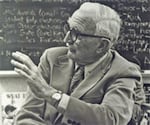
Wayne Morse served four terms (1945 -1969) in the U.S. Senate. He represented Oregon with brilliance and bravado and followed a vision of “principle above politics.” He could be quick to criticize, and he rankled many opponents. But he wrote and sponsored legislation that was well ahead of its time.
Morse also warned of an American war in Vietnam a full decade before an incident in the Gulf of Tonkin formally started it. He was one of just two members of Congress to vote against it. And for the rest of his career, Morse led a national outcry to end the war and bring the troops home.
A former campaign staff member recalled: "Morse did his homework. He had contempt for senators who did not do the homework." He could be quick to criticize and unwilling to compromise. And by changing political parties twice, he managed to rankle just about everybody at one time or another. But he also championed the U.S. Constitution with diligence. And guided by the rule of law, he sponsored a wide range of legislation that was well ahead of its time. This episode of OPB's "Oregon Experience" examines the life of the man who, though not Oregon-born, came to personify the feisty spirit of his adopted home state.
The Wisconsin native came to Oregon from the University of Minnesota where he had taught speech and studied law. He moved to the Eugene area in 1929 to teach law at the University of Oregon. And at age 31, he became the youngest law school dean in the country.
In the early days of collective bargaining, back when few rules existed for solving workplace conflicts, Morse arbitrated some of the country's biggest labor disputes. His repeated success with longshoremen's issues earned him the nickname, "Boss of the Waterfront." And at the outset of World War II, President Roosevelt appointed him to the National War Labor Board.
In 1944 he ran for a seat in the U.S. Senate as a Republican and won. But in 1952, he supported Democrat Adlai Stevenson for president, in protest of Dwight Eisenhower's policies, and declared himself an Independent. Then, in 1955, this self-described liberal decided to become a Democrat.
Morse promoted civil rights, funding for education, equal rights for women and health care for the elderly — often long before these issues drew public attention. But with the onset of the Vietnam War, other matters would, in his words, "pale to insignificance."
Morse was one of just two members of Congress to vote against the war.
"The famous line is that Morse didn't come early or late to the peace movement. There was a time when he was the peace movement," said Ron Abell, one of Morse's campaign workers interviewed in the documentary.
In 1968, Morse's bid for re-election did not go as expected, and a young, media-savvy Bob Packwood defeated the incumbent by a slim margin. Morse ran for the Senate again in 1972, challenging Mark Hatfield, and lost. In 1974 he challenged Packwood for his old seat, but as the campaign began to gather steam, Morse passed away.
Sen. Edward Kennedy said of the man known as 'The Tiger of the Senate': "Wayne Morse was daily proof in the halls of Congress that an individual can make a difference ... that a single voice of integrity, insight, understanding and compassion can change America and alter the flow of history."
Books
A. Robert Smith, The Tiger in the Senate: The Biography of Wayne Morse
Mason Drukman, Wayne Morse: A Political Biography
Web sites
Video Documentary: The Last Angry Man – Senator Wayne Morse
http://waynemorsecenter.uoregon.edu/_pages/about_morse/about_wayne.html
The Morse Center for Law and Politics at the University or Oregon: About Wayne Morse
Wayne L. Morse: A Political Maverick
A short account of Morse’s record filibuster in 1953
The Wikipedia entry on Morse – very good! (note the “External Links”)
The Morse Family Farm -- now a Eugene city park
Ron Abell’s “Personal Observations of the Wayne Morse Re-Election Campaign of 1968” (PDF)
Broadcast Date: February 21, 2012